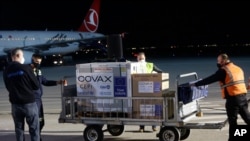Thursday, the United States plans to ship 35,100 doses of Pfizer COVID-19 vaccine to Kosovo through COVAX, the United Nations vaccine-sharing mechanism, a White House official told VOA.
The doses are part of the purchase of half-a-billion Pfizer doses secured by the Biden administration earlier this year.
Kosovo is experiencing another spike in infection largely due to the delta variant. Arben Vishaj, head of the Infectious Clinic in Pristina, told VOA on Wednesday that "98 percent of tests in his center have been diagnosed with the delta variant."
There have been 118,709 confirmed cases of COVID-19 with 2,281 deaths. Less than 550,000 vaccine doses have been administered in the country.
“We are grateful as a government but also as a people to the United States of America for its continued and unstinting assistance,” said Perparim Kryeziu, a Kosovo government spokesman, referring to U.S. vaccine donations.
“Our cooperation is multi-dimensional and obviously our relations are of a special type and importance. This assistance is coming at a very important moment of our battle against the pandemic, in particular against the delta variant,” said Kryeziu. “In recent weeks, Kosovo reached the highest average daily vaccination in the region. We are therefore grateful to the U.S. government for the assistance it is providing to Kosovo and for its global leadership role in combating the pandemic.”
In addition to $2 billion donated to COVAX, the Biden administration has pledged to purchase 500 million Pfizer vaccine doses and distribute them through the year to 92 low-income and lower middle-income countries that are members of COVAX and the African Union. It represents the largest purchase and donation of vaccine by a single country.
Even with its large vaccine donation program, the U.S. is being criticized for announcing its plan to provide booster shots to all Americans beginning September 20 and starting eight months after an individual’s second dose of the Pfizer and Moderna mRNA vaccines.
“The inequitable rollout of vaccines globally is not just a moral stain on wealthy nations, it’s prolonging the pandemic for the entire world. The longer it takes to share vaccines globally, the more variants we’ll see and the more booster shots we’ll need,” the ONE Campaign, which works against poverty and preventable disease, said in a statement to VOA.
So far, only 1.3% of people in poorer countries have received at least one COVID-19 vaccine dose.
President Joe Biden dismissed criticism that the U.S. is turning a blind eye to the fact that many around the world still have not received even a single dose.
“I know there's some world leaders who say America shouldn't get a third shot until other countries get their first shot. I disagree,” Biden said during remarks at the White House Wednesday.
“We can take care of America and help the world at the same time. In June and July America administered 50 million shots here in the United States. And we donated 100 million shots to other countries. That means that America has donated more vaccines to other countries than every other country in the world combined,” he said.
(VOA Albanian contributed to this report.)




